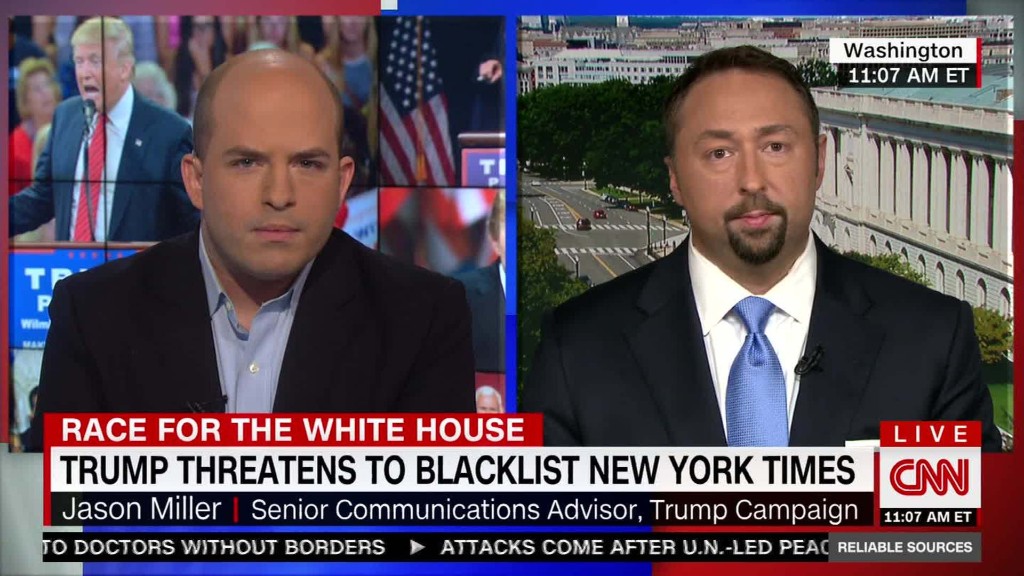
Conservative media friendships and alliances are breaking apart as Donald Trump's run for president roils the Republican Party.
This conservative media crackup has been happening for months, but this week it was broadcast on the airwaves like never before, with a verbal war of words involving Sean Hannity, Glenn Beck and Rush Limbaugh, three of America's most popular talk radio hosts.
Hannity, one of Trump's biggest boosters in the media, called out his counterparts for failing to support Trump and the GOP. He said on Tuesday that he'll hold figures like Beck, columnist Jonah Goldberg and the conservative publication National Review responsible if Hillary Clinton beats Trump.
"You own Hillary Clinton," Hannity said to them.
Prominent anti-Trump commentator Bill Kristol tweeted this response: "Hannity has become Lady Macbeth: Gradually becoming more unhinged as the man in whom he believes falters."
Beck responded differently, by saying there's no "holy war" going on and that he agrees with Hannity that Clinton "is a disaster."
So what's happening?
"All of us feel like we're trapped in a barn fire," Beck said, "so we don't know what to do."
The fracturing within conservative media circles, between Trump loyalists and opponents, mirrors the ongoing GOP civil war that Trump's candidacy has intensified.
It is triggering conversations that have rarely, if ever, been had before -- with some conservative commentators openly questioning the value of Fox News while others accuse Limbaugh of betraying his listeners.
On Monday Limbaugh, generally believed to be the most popular conservative talk show host in the country, was confronted by a caller about Trump's muddled message on deportations.
"I never took him seriously on this!" Limbaugh said.
"10 million people did," the caller, Rick in L.A., responded.
Rick told Limbaugh that "you that you are doing a disservice to all of us Republican primary voters who didn't vote for Trump, that are struggling whether or not to vote for Trump."
Conor Friedersdorf of The Atlantic said this back-and-forth was "the quintessential illustration" of how Limbaugh betrayed his listeners, by cheering on Trump instead of approaching the candidate skeptically.
The call went viral; Beck on Wednesday dubbed it "the call heard round the world."
But Limbaugh is off for the rest of the week, so he most likely won't be weighing in any further.
Other conservative media heavyweights are with Hannity and Limbaugh on the pro-Trump side. Radio host and Fox News contributor Laura Ingraham, for instance, is reportedly advising Trump during debate prep sessions. Ingraham has not confirmed those reports.
She tweeted Wednesday that sitting on the sidelines, as advocated by some anti-Trump conservatives, "will help Hillary."
Hannity has also acknowledged giving Trump advice. Former Fox News chief Roger Ailes has also been counseling the GOP nominee. And Breitbart News chairman Steve Bannon is now on leave from that job to be the Trump campaign's CEO.
This "melding of the so-called conservative commentary class with the Republican presidential nominee's campaign lacks precedent," Commentary's Noah Rothman wrote on Tuesday. "Some of the right's most prominent radio and television hosts and media executives serve not merely to provide the nominee with a stage on which to disseminate his message but as advisors crafting that message."
Critics of these commentators have nicknamed Fox News and right-wing radio the "conservative entertainment complex" and argued that it hurts the GOP.
David Frum and Joe Scarborough advanced this argument shortly after Mitt Romney lost the presidency in 2012.
The idea is back with a vengeance this summer.
Former Reagan and George H. W. Bush aide Bruce Bartlett, who is highly critical of the GOP, tweeted Wednesday, "The right-wing media are irrelevant, politically, because they only preach to the right-wing choir. Not one is aimed at non-right wingers."
And on Tuesday National Review's David French wrote that Fox is "killing the conservative movement" by providing a "comfortable conservative cocoon."
"Appearing on Fox can create an alluring but illusory fame, and in seeking it above all else, some of our best minds inadvertently limit their own influence," he wrote. "I don't resent Fox's existence, but I lament its effect on our movement. It's time to leave the cocoon."


